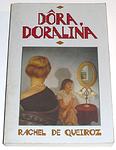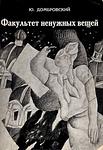The Greatest Russian, Brazilian "Historical fiction, Fiction" Books Since 1950
Click to learn how this list is calculated.
This list represents a comprehensive and trusted collection of the greatest books. Developed through a specialized algorithm, it brings together 300 'best of' book lists to form a definitive guide to the world's most acclaimed books. For those interested in how these books are chosen, additional details can be found on the rankings page.
Genres
Historical fiction is a genre of literature that combines fictional stories with real historical events, settings, and characters. These books often take place in a specific time period and are based on research and factual information, but also include imaginative elements to create a compelling narrative. Historical fiction allows readers to experience the past in a unique and engaging way, while also providing insight into the social, cultural, and political issues of the time.
Countries
Date Range
Reading Statistics
Click the button below to see how many of these books you've read!
Download
If you're interested in downloading this list as a CSV file for use in a spreadsheet application, you can easily do so by clicking the button below. Please note that to ensure a manageable file size and faster download, the CSV will include details for only the first 500 books.
Download-
1. Doctor Zhivago by Boris Pasternak
Set against the tumultuous backdrop of the Russian Revolution, the book follows the life of a physician and poet, Yuri Zhivago, as he navigates the political and social upheaval of the early 20th century. Torn between his love for two women, his wife Tonya and his passionate mistress Lara, Zhivago's personal struggles mirror the larger societal changes occurring around him. The novel explores themes of love, war, and the human spirit, offering a poignant and complex portrait of life during a time of revolutionary change.
-
2. Life and Fate by Vasily Grossman
"Life and Fate" is a sweeping epic that explores the human condition during the Siege of Stalingrad in World War II. The novel delves into the lives of a wide range of characters, from soldiers and scientists to children and victims of the Holocaust, providing a stark and unflinching portrayal of the horrors of war, the brutality of totalitarianism, and the resilience of the human spirit. At the same time, it also examines themes of love, loss, and the struggle for freedom and dignity in the face of overwhelming adversity.
-
3. The Devil to Pay in the Backlands by Joao Guimaraes Rosa
"The Devil to Pay in the Backlands" is a complex narrative that follows the life of a Brazilian sertanejo (backlands dweller) who becomes a bandit and a feared killer. Tormented by his violent actions, he embarks on a metaphysical journey, wrestling with philosophical and religious questions, and trying to reconcile his deep belief in fate and predestination with his own free will. The book is notable for its innovative language, blending regional dialects with neologisms and classical references, which adds to its rich portrayal of the Brazilian backlands.
-
4. Cancer Ward by Aleksandr Solzhenitsyn
"Cancer Ward" is a poignant novel set in a Soviet cancer hospital in the mid-1950s. It follows the lives and struggles of patients and doctors, exploring their personal histories, relationships, and the political environment of the time. The hospital serves as a metaphor for the oppressive Soviet state, with cancer symbolizing the malignant growth of totalitarianism. The book also explores themes of mortality, the human spirit, and the will to survive.
-
5. Summer in Baden-Baden by Leonid Tsypkin
"Summer in Baden-Baden" is a unique blend of fact and fiction that intertwines the author's own travels to Leningrad with a reimagining of Fyodor Dostoevsky's summer in Baden-Baden, Germany. The narrative shifts between the two journeys, exploring themes of obsession, identity, and the power of literature. The author's fascination with Dostoevsky serves as a lens through which he examines his own life and experiences as a Jew in Soviet Russia, while also providing a fresh perspective on the famous Russian author's life and works.
-
6. August 1914 by Aleksandr Solzhenitsyn
"August 1914" is a historical novel set during the early days of World War I, focusing on the disastrous Battle of Tannenberg on the Eastern Front. The book provides a detailed portrayal of the Russian army's defeat, largely due to incompetent leadership and lack of communication. The narrative also delves into the lives of the soldiers and civilians involved, offering a broad examination of Russian society and the impending revolution.
-
7. Gabriela, Clove and Cinnamon by Jorge Amado
Set in the 1920s in the Brazilian town of Ilhéus, the novel tells the story of a beautiful and charismatic migrant worker, Gabriela, who becomes a cook in the home of a wealthy bar owner. As the town, historically dominated by a few wealthy cacao planters, undergoes economic and social changes, Gabriela and her employer fall in love. Their relationship, however, is challenged by their different social statuses, the town's traditional values, and the employer's political ambitions. The story is a vivid portrayal of Brazilian culture, exploring themes of race, gender, class, and tradition versus progress.
-
8. Tent of Miracles by Jorge Amado
"Tent of Miracles" is a satirical novel that explores the themes of racism, colonialism, and the power of knowledge. The story revolves around the life of a poor, mixed-race Bahian scholar who is unrecognized in his own land but becomes a posthumous celebrity when a Nobel laureate praises his work. This sudden fame brings attention to his writings and his message against racial discrimination, and the book also portrays the vibrant culture and diversity of Bahia, Brazil.
-
9. Sofia Petrovna by Lydia Chukovskaya
The book is a poignant narrative set during the Stalinist purges of the 1930s in the Soviet Union. It follows the story of a loyal and hardworking widow who is confronted with the brutal reality of the regime when her beloved son is arrested on false charges. As she navigates the Kafkaesque bureaucracy to seek justice for her son, her faith in the government and its policies is shattered. The novel offers a harrowing look at the terror of the Great Purge and the impact of political oppression on the lives of ordinary citizens, as the protagonist grapples with the disintegration of her world and the moral dilemmas posed by a society steeped in fear and denunciations.
-
10. Dora, Doralina by Rachel de Queiroz
This novel follows the journey of a young woman in early 20th-century Brazil as she breaks free from the constraints of a repressive household and an arranged marriage. Yearning for independence and driven by a rebellious spirit, she embarks on a transformative adventure that takes her from the conservative hinterlands to the more liberal coastal cities. Along the way, she encounters a variety of characters, confronts the challenges of a society in flux, and seeks to define her own identity against the backdrop of a country grappling with modernization and change. Her story is a poignant exploration of self-discovery, feminism, and the quest for personal freedom.
-
11. The Burn: A Novel in Three Books : (late Sixties--early Seventies) by Vassily Aksyonov
"The Burn: A Novel in Three Books : (late Sixties--early Seventies)" is a historical novel that explores the cultural and political landscape of the Soviet Union during the late 1960s and early 1970s. The book follows a group of intellectuals, artists, and dissidents who are striving to preserve their individuality and freedom in a society that is increasingly oppressive and conformist. The narrative is punctuated by surreal and fantastical elements, reflecting the characters' struggle to maintain their sanity and dignity in a world that seems to be spiraling into madness.
-
12. The Faculty of Useless Knowledge by Yuri Dombrovsky
"The Faculty of Useless Knowledge" delves into the life of a historian caught in the oppressive atmosphere of Stalinist Russia. The narrative explores the intellectual and emotional turmoil of the protagonist, who is ensnared in the brutal machinery of the Soviet state's ideological and bureaucratic control. Through his experiences and reflections, the book examines themes of memory, history, and the struggle to maintain intellectual integrity in a repressive society. The protagonist's journey is a poignant commentary on the value of knowledge and the human spirit's resilience against totalitarian forces.
-
13. Farewell To Matyora by Valentin Rasputin
The book is a poignant exploration of the tension between progress and tradition, set in a small Siberian village that is doomed to be submerged by the construction of a hydroelectric dam. As the government mandates the relocation of the village's inhabitants, the narrative delves into the lives of the villagers who are grappling with the loss of their ancestral home and way of life. The story is a meditation on the cost of modernization, the deep connection between people and their land, and the inevitable passing of time that brings change, often at the expense of cultural heritage and personal identity. Through the villagers' resistance and sorrow, the novel examines themes of environmental impact, the clash of ideologies, and the resilience of the human spirit in the face of displacement.
-
14. Medea And Her Children by Lyudmila Ulitskaya
"Medea And Her Children" by Lyudmila Ulitskaya is a powerful and emotionally charged novel that delves into the complex relationships between a mother and her children. Set in Soviet Russia, the story follows the lives of three generations of women as they navigate the challenges of love, sacrifice, and the oppressive political climate. Through vivid and compelling storytelling, Ulitskaya explores the universal themes of family, loyalty, and the enduring strength of a mother's love.
-
15. Klotsvog by Margarita Khemlin
"Klotsvog" is a poignant and introspective novel that follows the life of Maya Abramovna Klotsvog, a Jewish woman living in Soviet Russia during the 20th century. Through Maya's perspective, the book explores themes of identity, love, and the struggles faced by Jews in a society plagued by anti-Semitism. With a blend of humor and tragedy, the story delves into Maya's personal relationships, her experiences as a mother and wife, and her resilience in the face of adversity. Ultimately, "Klotsvog" is a profound exploration of one woman's journey through life and her unwavering spirit in the midst of societal challenges.
-
16. Zuleikha by Guzel Yakhina
"Zuleikha" is a captivating historical novel set in 1930s Soviet Union, following the life of Zuleikha, a Tatar woman who is forcefully taken from her home and exiled to Siberia. As she struggles to adapt to the harsh conditions of the remote village, Zuleikha finds solace in her resilience and the unexpected connections she forms with her fellow exiles. Through her journey of survival, love, and self-discovery, Zuleikha's story beautifully explores themes of identity, freedom, and the indomitable human spirit.
Reading Statistics
Click the button below to see how many of these books you've read!
Download
If you're interested in downloading this list as a CSV file for use in a spreadsheet application, you can easily do so by clicking the button below. Please note that to ensure a manageable file size and faster download, the CSV will include details for only the first 500 books.
Download














